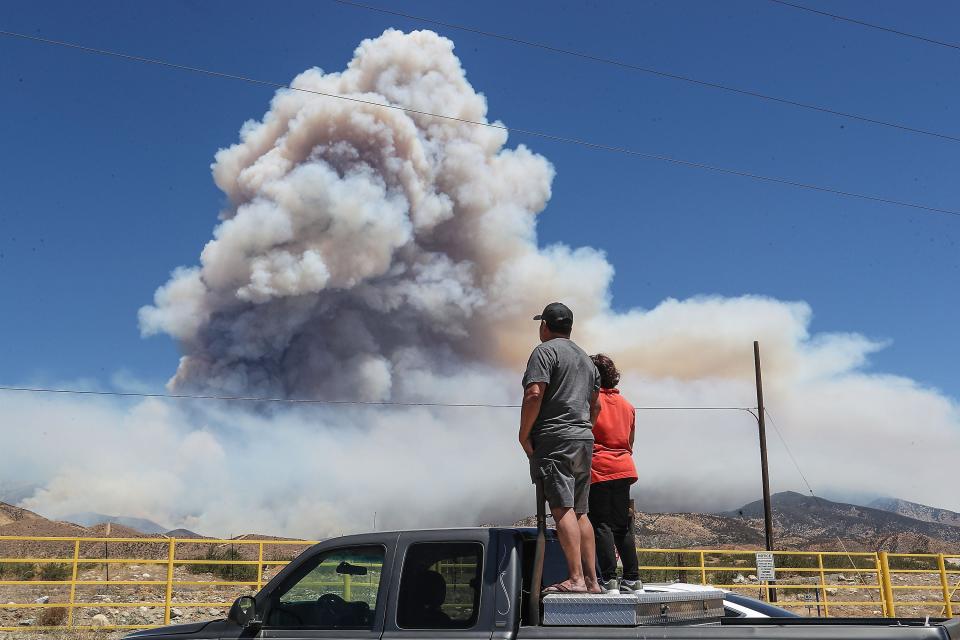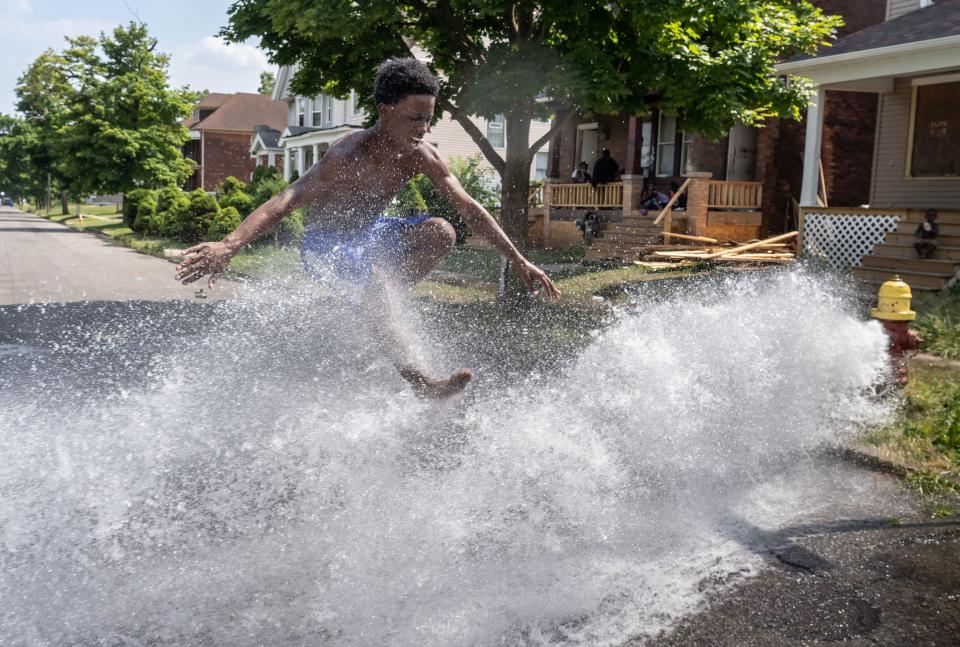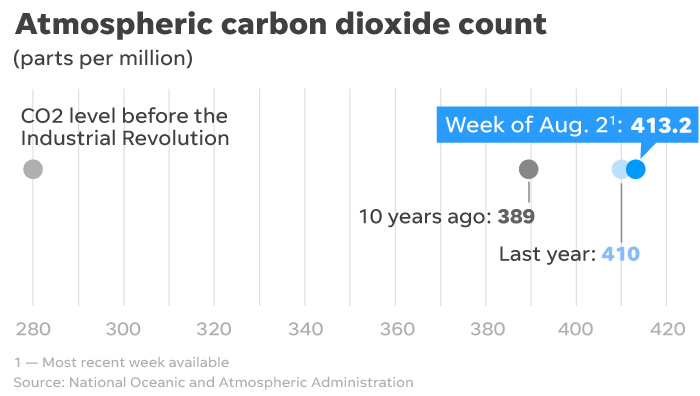Climate Point: Trouble in the Galapagos. Drilling in Alaska? And more record heat.
Welcome to Climate Point, your weekly guide to climate, energy and environment news from around the Golden State and the country. In Palm Springs, Calif., I’m Mark Olalde.
We'll get to wildfires, scorching temperatures and Beltway politics shortly, but let's start in our nation's heartland, where The Indianapolis Star reports that the state agency tasked with protecting the environment has been flooded with requests to ease up on rules during the coronavirus pandemic. Many of the asks came from typical polluters, for example, a coal company with a history of violations, leaving the state trying to walk a fine line in granting exceptions.
And while we're talking about our great Indianapolis partners in the USA Today Network, a quick shout out to a new effort by reporters London Gibson and Sarah Bowman to answer your burning questions about the environment in that region. They're calling it the "Scrub Hub," and they've steeled themselves to answer your toughest queries and quandaries.
And now, here's some other important reporting from around the country (and world)...
MUST-READ STORIES
Fishing for trouble. China's abysmal environmental track record is no secret and neither are its international ambitions. The Guardian reports the latest twist, as a fleet of more than 200 Chinese-flagged fishing vessels is threatening the Galapagos islands, world-renowned for their biodiversity. "It was a slaughterhouse," one scientist who has been studying species around the islands told the newspaper of Asian fleets' fishing methods.
You take my breath away. Back in the U.S., Sharon Lerner reports for The Intercept on the realities of environmental racism. She dives into the confluence of COVID-19, the environment and demographics, writing that the pandemic has actually made pollution worse in some unsettling ways. In New Jersey, for example, regulators expanded permits for crematoriums to allow them to continuously operate due to such an increase in deaths. In one Newark neighborhood, this means a 24/7 stream of virus-fueled air emissions coming from five different sites.
What is pristine wilderness worth? When it comes to campaign promises, President Donald Trump has done his best to stick to his word. One promise, expanded domestic fossil fuel production, has been stymied by forces like the pandemic, but the president has a chance to achieve a "decadeslong Republican dream" in Alaskan oil and gas. The administration is expected to soon sell the first leases for drilling in the Arctic National Wildlife Refuge, although there's one problem (besides climate change and habitat destruction). It appears that politicos are meddling in the scientific review process that must be completed before such a decision. Adam Federman investigates for Politico.
POLITICAL CLIMATE

Breaking barriers. Win or lose, Sen. Kamala Harris, D-Calif., already checked a number of firsts when former Vice President Joe Biden selected her as his running mate. She's been blasted for being everything from not progressive enough to too progressive, so what does she mean for Democrats and their ever-shifting stance on the environment? InsideClimate News provides one interesting take on that question, writing that she's not the greenest candidate in history but that she's leaning further that way over time. Of note, Harris has promised that, if she and Biden win, she would bring her background as a prosecutor to the White House and make polluters pay while also prioritizing issues of environmental justice.
Trumping science. Meanwhile, the current administration continues to roll back environmental regulations at a breathtaking clip. The latest step came via the Environmental Protection Agency, which targeted rules governing methane emitted by oil and gas companies, HuffPost reports. For reference, methane has 86 times the warming potential of carbon dioxide in the short term, and the oil and gas industry is a massive emitter via unchecked leaks in its infrastructure.
A red-hot debate. While we're talking about the world getting hotter...wildfires. For The Desert Sun, I recently wrote about the Apple Fire, which has become the second-largest blaze in this part of Southern California in more than a decade. But wildfire management has been too successful over the past century. The result is a carpet of highly flammable fuel throughout the West's forests and grasslands. More and more, though, scientists are arguing that government land management agencies have over-corrected, now taking a burn-first approach that decimates landscapes while doing little to stop catastrophic infernos.

FOSSIL FUELS VS. RENEWABLES
Black and blue. Oil and water don't mix. Well, they're not supposed to, at least. The BBC reports that a Japanese tanker has been grounded off the shore of Mauritius, an African island nation, for several weeks and recently started leaking oil. While the toxic spill is small compared to more famous catastrophes, it's dumping into the Blue Bay Marine Park reserve, "a wetland of international importance."
Baltimore blowup. A huge explosion in Baltimore on Monday ripped apart three rowhouses, The Baltimore Sun writes, leaving one person dead. It's far from the first time a gas leak has led to such a fatal outcome, and some activists are seizing on the moment to call for homes to be electrified to alleviate concerns of safety, public health and emissions.
Sun in the sky, you know how I feel. Wood Mackenzie, an international consulting firm, predicts solar installations will drop this year due to the COVID-19 pandemic, Greentech Media reports. But the firm's analysis isn't all gloomy news for the growing renewable energy source. About 70% of the country's commercial buildings are still targets for economically viable solar arrays, which could translate to 145 gigawatts of electricity potential.
AND ANOTHER THING

Mercury rising. If you keep up with this newsletter, you know we cover a lot of ground each week. But, the central question of climate change remains. Sometimes it's tough to see how invisible molecules of carbon dioxide and other gases are rapidly changing our planet. This wasn't one of those weeks.
The Arizona Republic reported that Phoenix just had its hottest summer in recorded history. The Washington Post reported that Baghdad's record-breaking heat is so bad that metal door handles can blister skin. And Dinah Voyles Pulver and I reported that California, too, is throwing out the history book. Palm Springs recently hit 122 degrees. Climate change is here.
Scientists agree that to maintain a livable planet, we need to reduce the atmospheric carbon dioxide concentration back to 350 ppm. We’re above that and rising dangerously. Here are the latest numbers:

That’s all for now. Don’t forget to follow along on Twitter at @MarkOlalde. You can also reach me at molalde@gannett.com. You can sign up to get Climate Point in your inbox for free here. And, if you’d like to receive a daily round-up of California news (also for free!), you can sign up for USA Today’s In California newsletter here. Wear a mask. Cheers.
This article originally appeared on USA TODAY: Harris vows to be tough on polluters; more Trump environmental rollbacks

